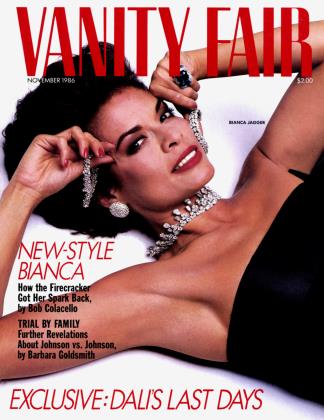Sign In to Your Account
Subscribers have complete access to the archive.
Sign In Not a Subscriber?Join NowOut to Lunch with Warner LeRoy
The Liberace of restaurateurs sends back the Potomac cappuccino, with BILL THOMAS
BILL THOMAS
'To tell you the truth," says Warner LeRoy, the round restaurateur, "I'm really two people." And obviously they both love to eat. But one Warner shows up for lunch at his new Washington, D.C., restaurant dressed like a giant Baked Alaska and gets steamed if the service isn't perfect. The other Warner's just the opposite—an ordinary 270-pound guy who wears blue jeans and enjoys puttering peacefully in his garden. "That's the way I am most of the time. The clothes and the rest of it I do for show business. When I'm woricing, I'm like a director. My cafe is my movie, and I want everybody to play a part."
And he does mean everybody.
His latest production, Potomac, overlooking the river of the same name, seats one thousand and requires a supporting cast of more than four hundred chefs, waiters, butchers, and florists, not to mention the Indian tribe in Florida that grows his hearts of palm, or his warehouse staff in New York. "We'll add more as we get bigger," he predicts, sizing up a healthy plateful of linguine and shrimp. Plans are already on the drawing board for a nautical carryout and round-trip boat service to the Kennedy Center, a halfmile downstream. If there's one thing Warner LeRoy has learned after twenty years in food, it's to put everything on the table. Lose your nerve in this business and you're a leftover.
For the great-nephew of movie mogul Jack Warner and the son of director Mervyn LeRoy, glitter is almost second nature. But growing up in Hollywood also taught him a lesson he'll never forget. "My father made The Wizard of Oz when I was four years old. Boy, I spent a lot of time playing on that set. Once, I remember skipping down the Yellow Brick Road and suddenly running right into the backdrop. The actual road was only twenty feet long! The rest was this incredible piece of scenery. I guess that's where I learned the difference between fantasy and reality."
And just in case that didn't do it, Toto did. "I got to keep Toto after they finished the movie. He was O.K., I suppose. But I wasn't that crazy about him. In fact, he turned out to be a pretty difficult dog.. . We had to give him away after a couple of years."
So don't think LeRoy, the impresario behind Tavern on the Green and Maxwell's Plum, doesn't know that building an illusion takes a lot of hard work.
"I started making plans for Potomac five years before it opened. Arthur Cotton Moore was the architect, but I designed the space myself. Everything here is mine. Take the twenty-four crystal chandeliers. These aren't just something you can go out and buy. First you have to design each crystal, which I did. Then you make a steel mold. Then you have to find somebody to cast it. The problem is there's only one man in the world who can do it in color, and he's in Germany. The complexity is unbelievable." Unbelievable is one of Warner LeRoy's favorite words.
"How was your grilled swordfish?" he asks. Before I can answer, we're off for a closer inspection of the main dining room, which could easily pass for Kubla Khan's veranda. "There are 800,000 jewels in the ceilings, all handcast and hand-set. It took two hundred men two months to finish the job. Again, it's all my design." For a moment he admires his creation, as if he's just noticed something in the arrangement of colored stones and glass he's never seen before.
"The detail is unbelievable. Now look at the floor. There are forty-nine different colors in that carpet. Most carpet companies said you can only do thirty-two. They were wrong. The I reason I wanted forty-nine wasn't ⅞ just to do it, but to get the right shade. Having all those colors is how you get it to look so rich."
The effect he's trying to create, he says, is the feeling of being on an ocean liner. Some critics have carried that idea a little further and suggested that Potomac will be another Titanic.
"I think we're going to surprise a few people. Our operating philosophy is very egalitarian. This is a grand cafe, and a grand cafe, at least my version of one, is a spectacle that's open to everybody. I don't think there's any major stodginess in Washington. People here like to have as much fun as people anywhere. You know, when I opened Great Adventure safari park in New Jersey, the experts said, You can't mix all those animals together, they'll kill one another. Well, they didn't, and it became a tremendous success. Here we're people-mixing, and adding great food. It's the same principle."
LeRoy spends two days a week in Washington, with an eagle eye on his latest great adventure. When his cappuccino fails to pass inspection, it is promptly sent back to the kitchen. "Not enough froth," he tells the waiter. "Try it again." In a few minutes, the embarrassed waiter returns with another cup. "Now, that's more like it," says LeRoy, taking a studious sip. "Ummmm. Yes."
 View Full Issue
View Full Issue


















Subscribers have complete access to the archive.
Sign In Not a Subscriber?Join Now